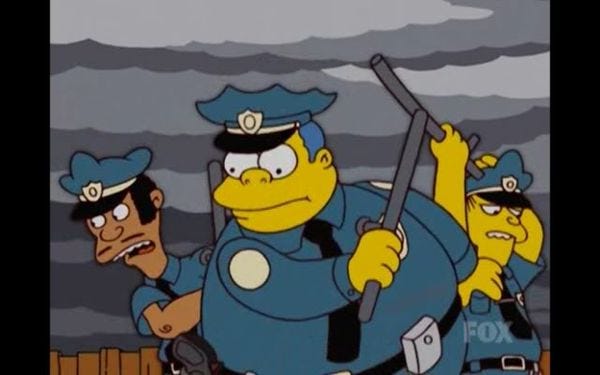NYPD Making Friends And Influencing People, Except The Opposite Of That
New York cops may want to rethink whether they were making friends and influencing people when they turned their backs on Mayor Bill de Blasio at funerals of two murdered NYPD officers. A new Quinnipiac University poll of New York City voters found that on the whole, people disapproved of the act by a margin of 69-27 percent. Only one demographic category approved, and just barely: Republicans were cool with it, 51-47 percent. Even cop-friendly Staten Island residents disapproved, although by the narrowest margin of any borough, with 50 percent disapproving and 47 percent approving.
New Yorkers were even more disenchanted by NYPD union head and Cop Fight! instigator Patrick Lynch's claim that the Mayor's office has "blood on its hands" following the murder of the two officers in December: 77 percent found the comment "too extreme," and only 17 percent found it "appropriate." Not a single group in the demographic breakdown found the comment appropriate, although we should note that the poll did not include a category for "sociopathic asshats."
Opinions on Bill de Blasio showed some big splits between demographic groups. While overall responses (47-37 percent) said they agreed that de Blasio's "statements and actions" show he supports police, there were huge gaps by race and political party: 69 percent of black respondents said de Blasio supports police, 53 percent of Hispanics said he supports them, but only 36 percent of whites thought he was supportive, and 49 percent of whites said he does not (but they still wouldn't turn their backs on him at a funeral, so at least you know their moms raised them right). Seventy percent of Republicans said de Blasio doesn't support police, while 58 percent of Democrats said he does support them.
There was a little bit of fodder for fans of "both sides are awful," and you can expect this to show up on Fox News: Lynch got overall negative favorability ratings -- 39 percent unfavorable and 18 percent favorable. Voters also had a negative view of Rev. Al Sharpton, with 53 percent unfavorable and 29 percent favorable views. It should perhaps be noted that Rev. Sharpton is not actually a city employee. Perhaps.
Respondents were more divided on the amount of influence Sharpton supposedly has on Mayor de Blasio, with 37 percent saying Sharpton has too much influence, 34 percent saying he has just about the right amount of influence, and 8 percent wanting him to have more influence. Needless to say, the Sharpton questions had some of the biggest splits between white and black respondents -- 67 percent of blacks said he was a positive influence in the city, while only 20 percent of whites did. Get ready to hear some whiny editorials about those numbers, too.
Also too, nobody seems to buy the police union's claim that officers are making fewer arrests and issuing fewer citations for low-level crimes because they fear for their safety. Fifty-six percent of voters said they believe it's a protest, and only 27 percent thought it was because cops are afraid. And a majority, 57 percent, said they believed that cops protesting by not doing their jobs should be disciplined. Not that that's going to happen, of course.
Most respondents thought that New York City has a problem with police brutality: 36 percent said it was a "very serious" problem, 34 percent said it was "somewhat serious," and only 19 percent said it wasn't very serious and 8 percent thought it was not a problem at all. We wonder if maybe this might have anything to do with a report last fall that the NYPD had paid out a billion dollars to settle lawsuits against it over the past decade. Just maybe.
And in bad news for the police unions, who insist that it's an incitement to murder to suggest that police treat blacks differently from whites, 66 percent of the good people of New York agree that police in New York are "generally tougher on blacks," while only 27 percent think cops treat both blacks and whites the same. Again, some predictable divisions: Majorities of both white and black respondents said cops were tougher on blacks, but 53 percent of whites thought so, while 87 percent of blacks agreed. And again, the breakdown by borough was telling: Staten Island was the only borough where a majority -- 53 percent -- thought that policing was pretty much equal; only 39 percent thought that police were tougher on blacks. Way to go, Cop Land.
No word yet on whether Patrick Lynch is planning to accuse two-thirds of New York City voters of having blood on their hands and call for them to resign immediately.




The cops who thought they were making a statement by not doing their jobs might be surprised to learn that the statement they made was "New York City does not need so many cops."
Chokings and shootings, also too, for variety.